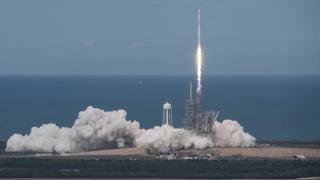With the announcement of an Australian space agency, the space start-ups of Australia must feel like the Hollywood hopefuls who became an overnight success after ten years of hard work. These companies have a toehold in a high-tech, high-growth industry, and part of the task for ex-CSIRO head Dr Megan Clark as she designs the agency is to help them succeed.
These companies – unlike their orbiting creations – will not do well in a vacuum. Success for Australian industry will come through full engagement with the projects, supply chains and experience of the much larger global industry. Clearing the path to Australian participation is an ideal role for a 21st century space agency.
The space business is changing. New companies have flourished using cheap off-the-shelf electronics to build ‘good enough’ small satellites for a thousandth of the cost of 20 years ago.
The space business is changing. New companies have flourished using cheap off-the-shelf electronics to build ‘good enough’ small satellites for a thousandth of the cost of 20 years ago. The companies pushing this approach resemble Silicon Valley in their audacious plans, their fail-tolerant mentality and their emphasis on private funding over government contracts.
Simultaneously, dot-com billionaires including Elon Musk, Jeff Bezos and Paul Allen have poured fortunes into their own spaceflight programs. They are pushing plans for space exploration that run ahead of national governments.
These forces have powered a boom in space start-ups. Venture capital funding in the industry has spiked to US$1.5B across 2015-16. The optimism in the US space sector has flowed to Australia, where the space industry counts 40 start-ups and growing.
Given this commercial dynamism, it’s right to ask what role Australia’s space agency should play. Striking international agreements to open funding, projects and experience for Australian industry would be a good start. Developing existing relationships with the United States and Europe will help deliver a winning edge as Australian companies compete commercially with other ‘emerging’ space nations.
The global space industry is worth US$330B, mostly driven by the United States and Europe. Yet much of this market is closed to the Australian space sector. In Europe, preference is given to members of the 22-nation European Space Agency. And in the United States, restrictive laws meant to protect national security mean that commercial cooperation – even with allies – often falls in the too hard basket.
The only way for Australia to join in without a disproportionate cost to the taxpayer is to reach out to our international partners. And the invitations to all these opportunities exist.
Opening these markets would improve the survival odds for emerging Australian space companies. It would dramatically increase the dollars on offer and provide longer-term income stability. Global participation would also bring the chance to learn from experienced companies and extend national capabilities.
Individuals need global experience to develop, as the resumes of top Australian space innovators bear out. For instance, Chris Boshuizen, co-founder of satellite start-up Planet which is currently close to a US$1B valuation, left Australia to work for NASA. Adelaide-based Fleet’s CEO Flavia Tata-Nardini began at the European Space Agency and Jason Held of Saber Astronautics was an officer in US Space Command. Enabling early career steps like these is not a ‘brain drain;’ rather, it is an unavoidable step in building Australian capability when we are behind.
International opportunities offer access to the most exciting projects that inspire future generations of Australian talent. We can’t pursue the most motivating areas such as human spaceflight or robotic exploration on our own. The only way to join in without a disproportionate cost to the taxpayer is to reach out to our international partners. And the invitations to all these opportunities exist.
The United States builds more than 60 per cent of the world’s satellites, and its government spends more on space (US$44.5b) than all others combined. Australia already cooperates deeply with the United States in national security space activities, and has famously hosted ground facilities since the Apollo missions. Australia has a position of unique trust with the world’s largest space economy that should be leveraged as we seek competitive advantage for our emerging space sector.
Europe also has a wealth of space expertise, and cooperative arrangements for ground stations and launch vehicles that go back to early launches from Woomera. Europe’s engagement extends beyond its geography, and it has a well-tested mechanism for bringing participants as far-flung as Canada into its activities. The top European space official was blunt when visiting in September: he was merely waiting for Australia to signal interest in order to start a process for us to become a cooperating member.
There will be other opportunities, too, with growing space activity in Asia where China and India are major space powers. Australia needs to be deft to strike the right balance in its network of relationships given the inherently sensitive character of space activity.
In the wake of the announcement of the space agency, many have asked ‘what will it actually do?’ Perhaps in this era of commercial space the answer is not so far from government in more down-to-Earth sectors: clear roadblocks and open markets for Australian companies; strike deals with international partners and develop relationships that unfold in Australia’s long-term interest. It will be a promising start.






